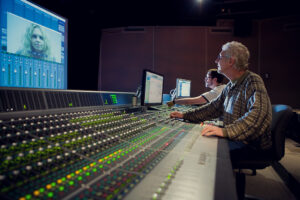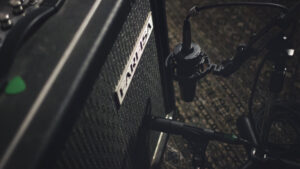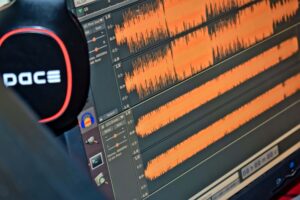You’re probably asking yourself why you’d even consider learning how to rewrite a song. I may be wrong though… Maybe you know EXACTLY why learning to repurpose your songs can become one of your most valuable assets. I’ve been producing music since I was 16 years old, so we can’t expect our oldest tracks to keep up with our latest and greatest. It’s actually a GOOD sign!
Learning how to rewrite a song can seem like a daunting task at first, but it’s an essential practice. Your skills as a music producer will evolve as the years go by, however, ideas remain somewhat “static”. An idea is like a seed and the creative process is what allows it to develop into a tangible medium (a song). In short, rewriting a song is as simple as starting from this seed and putting it through this creative process once more. There are many ways to approach rewriting a song, so I’ll be going over several in this article.
- How to rewrite a song from scratch (and enjoy it)
- How to rearrange a song to fit a variety of different applications
- The technical aspects of learning how to rewrite a song
- Using reference tracks to rewrite a song
- Rewrite a song until you are impressed with the results
How to rewrite a song from scratch (and enjoy it)
Perhaps you’ve created a song in the past that never really seemed to satisfy your “inner critic”. If you feel that way about ANY of your productions, you should honour and respect your judgement. After all, making music is all about expressing yourself honestly, so putting out “unripe” ideas into the world isn’t in your best interest.

It’s perfectly alright to put something down (it may actually be crucial at times), but we should get into the habit of revisiting them somewhere down the line.
What we NEED to realize, is that EVERY idea is perfect in itself. However, the creative process isn’t always successful, which is what leaves us unsatisfied.
The real problem is when we become ATTACHED to the result, regardless of the outcome. Hey, your song may have actually turned out pretty well, BUT…
Sometimes, being “satisfied” with something stops that thing from achieving its full potential. For example, I’ve produced demos that sounded good at the time (and still do), but that demo still has the potential of GROWING!
If we get ATTACHED to the result, we forget that it was the creative process that was responsible. In other words, we become LAZY by simply accepting our songs as they are instead of seeing them as the first version of many.
Imagine how much better your song will sound after going through this process several times. Your creative process can only increase in quality through consistent practice. And remember, it’s the experience of MAKING the song that excites us!
So, if you think you need to rewrite an entire song from scratch, here’s what you need to do…
- Open a NEW project in your recording software (Logic Pro, Pro Tools, Cubase, etc…)
- Try to remember your original idea in its SIMPLEST form
- Start the creative process once more and try to do things as DIFFERENTLY as you feel the need to
- Your next version should sound similar to the first, but more REFINED
- Keep going through this process as OFTEN as you need to
I hope you’re starting to see the value of going back to the “drawing board”. It’s very difficult to re-initiate the creative process by opening a project that already exists. Your “inner perfectionist” will stop you from moving forward.
How to rearrange a song to fit a variety of different applications
You may have yourself a fully “ripened” song, but this doesn’t mean you’re done. You may need to repurpose that song for a specific opportunity. This is much easier than learning how to rewrite a song from scratch, but it still requires creativity.

When it comes to arranging music, the possibilities are literally ENDLESS! Just try to imagine all the possible SHAPES AND FORMS your song can take…
- You can completely change all the instruments
- You can shorten it or lengthen it
- You can add one or multiple solo sections
- You can add or remove instruments
For example, you may have created a song that can be categorized as “rock/pop”, but what about making an orchestral version? The essence of your song will remain the same (rhythms, harmony, melody, etc…), but the instrumentation will change.
However, such a process will require some serious consideration because certain parts will need to be accommodated. Each instrument performs differently, so you may need to modify certain parts for optimal playback.
Certain opportunities may also require a more condensed/stripped down version of your song. This can be as simple as removing a few measures and rearranging when each part comes in. You may also opt to remove certain parts altogether.
For example, in the TV/Film industry, lead instruments are often removed from the mix altogether. Creating alternate mixes is a surefire way to provide as much value to your clients and/or listeners as possible!
I encourage you to experiment with your tracks and to create as MANY versions as you can. This will help you hear your song from multiple perspectives and it will also stop you from getting ATTACHED to any particular version.
Think of the word EXPANSION as a mantra for the rest of your music career. You can literally create a musical universe from one song!
The technical aspects of learning how to rewrite a song
The most important thing as a music producer to develop an EAR for details. It’s not enough to simply say “I’m not satisfied with this song”. We need to know EXACTLY what it is about that song that leaves you unsatisfied!

Is it the chord progression? The voice-leading? The selection of timbres? Be specific!
Putting an idea through the creative process several times can become futile if we don’t address some of these problems. This is why I told you earlier to try DIFFERENT things. If you’re hesitant on one aspect of your song, change it!
By trying different things out, you’ll begin to identify what it is about that one part that doesn’t sound right. Thinking about it won’t solve your problems, we need to act on our intentions!
For example, you may have doubts about a certain chord progression. However, it may NOT be the progression itself that sounds bad, but the VOICE-LEADING. Impeccable voice-leading can make even the most absurd progressions sound EPIC!
Is this starting to sound a bit complex? GOOD!
Learning a bit of music theory can seriously augment the quality of your compositions. It will literally give you the “toolbelt” you need to get to work. Otherwise, you’re just repeating the same thing and expecting different results (that’s what insanity looks like).
In other words, we shouldn’t be using music theory to CREATE. We should be using music theory to EDIT. As music producers, we’re like mechanics attempting to diagnose a problem in order to find a SOLUTION!
So, when you’re having difficulty diagnosing these problems, you may need to open a book (or a YouTube video). Listening to music you think is BETTER will also give you some useful insight.
Using reference tracks to rewrite a song
When in doubt, music that you PERSONALLY find to be of a higher calibre will be your best teacher. We need to learn how to ASK the music relevant questions, literally! For example, you may want to ask “why does the hi-hat on this track sound so good”.

Can you see how SPECIFIC that question is? You’re most likely asking yourself that very same question when you listen to your track! Well, more like “why DOESN’T it sound so good”.
By asking the song a question, we’re able to study that very song to find our answer. Our ears are like antennas, so we need to tune them into those VERY specific frequencies!
We refer to this process as “active listening” and this skill is invaluable. You literally cannot expect to have a successful music career without cultivating this skill. This is how we can truly become independent and learn to trust our own judgement.
So from now on, stop listening to music “passively”. There’s only so much your ears can absorb without you making a conscious effort to do so. And let me tell you, learning this practice will render any book/manual on music theory obsolete.
The only thing I cannot stress enough is to use music that YOU like. Forget about everyone else’s opinion and honour yours. When listening to an album, there may only be a handful of tracks that you deem WORTHY of being your teachers.
I got into the habit of creating playlists for each artist I listen to in order to “distill” what works for me. Study these songs on a daily basis and use what you HEAR to make your songs fit that STANDARD.
Having standards as a music producer is essential. Without them, you’ll always need someone to hold you by the hand. However, this doesn’t mean that you shouldn’t get feedback from your peers every once in a while.
Rewrite a song until you are impressed with the results
Being satisfied is just the “tip of the iceberg”. As growing music producers, we should strive to IMPRESS ourselves with our work. In other words, you want to feel like “I had no idea I could do this”.
As we push our boundaries, we will begin to create new standards for ourselves. If possible, I encourage you to rework as many songs as possible until they adhere to YOUR current standards.
Much like ourselves, music is in a constant state of change. Getting into the creative flow/creative process is a lifelong commitment. The less resistance we create, the more enjoyable the rest of your music career will become!
Becoming ATTACHED to end-results is the best way to settle for mediocrity. Avoid indulging too much in your creations as this will stop you from progressing. DON’T be afraid to start it all from scratch once more, just to hear more possibilities. How do you know what your song should sound like?
Once you’ve created several versions of each track, you’ll be in a position to make effective decisions. What works and what doesn’t will become quite evident. At this point, you’ll have the insight required to create your “final version”, BUT…
Nothing is ever FINAL in this world of ours. Keeping this in mind will keep your “inner perfectionist” in check. After all, perfection is a heading, not a destination. The journey itself is the real treasure we should all be grateful for!
I hope this article has given some insight into a problem you may or may not have been aware of! Focus on the creative process and I guarantee you’ll wind up impressing yourself on a daily basis.
Please consider sharing this article with your friends and/or colleagues. I also appreciate your comments, so feel free to ask me any questions as well.










2 thoughts on “How to Rewrite a Song | Mastering the Creative Process”
hello, i really want to first appreciate your effort in putting this great website together and writing this article. i wrote a song about 2 years ago and getting to rewrite the song became an issue, i wasnt just feeling it and i didnt know where to start from. but with this article. i am doing it this week.
Hey Benny!
I’m glad you’ve found the inspiration to pick your song back up again. Enjoy the experience of revisiting it and I guarantee you’ll be impressed by how much better it will sound!
Thanks for stopping by.
– Stefan